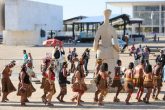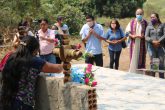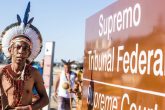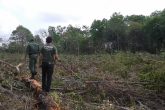Newletter 893 – Once again Indigenous People injured in eviction in Mato Grosso do Sul
INDIGENOUS PEOPLE INJURED IN DISPOSSESSION FROM FAZENDA REMAIN ON ROADSIDE IN MATO GROSSO DO SUL
Circa 20 Guarani Kaiowá persons from the villages of Sassoró and Porto Lindo were injured on December 8 by private security forces of fazenda titleholders from the region of the municipality of Iguatemi, in Mato Grosso do Sul. They were evicted from part of their traditional land, to which they had returned one week ago. The aggressors broke the arm of a 73 year-old Guarani Kaiowá elder.
The injured Guarani were treated by a doctor from the National Health Foundation (FUNASA), who found them at the side of the highway known as 7 Placas. They presented hematomas and lacerations on their bodies. Some injuries were the result of being shot with rubber bullets. A rubber bullet was found in the clothing of one of the injured. According to the indigenous report, the aggressors used wire and clubs as well as guns in the attack.
Five of the Guarani Kaiowá, an elderly community member among them, were seriously injured and hospitalized in the city of Tacuru. The others remain at the side of the road. “We do not have food, nor tarps [for shelter]. Today the fazendeiros came here with the security forces and said that we are not going to have our land”, stated Solano Lopes, one of the leaders of the group that reclaimed the tekohá (traditional land) Pueblito Kue.
Today the Guarani await the presence of the National Foundation for Indigenous Affairs (Funai) and the Federal Police in the area. The Federal Public Ministry in Mato Grosso do Sul asked that the confrontation be investigated.
***
CNPI RECOMMENDS CONGRESS APPROVE LAW REGULATING PROJECTS IN INDIGENOUS LANDS
The National Commission for Indigenous Policy (CNPI) has recommended that the National Congress approve complementary legislation that regulates exploitation of natural resources in indigenous lands, determining what enterprises can be considered to be of relevant national interest. This regulation would bring greater security to the indigenous peoples facing projects that could impact their lands.
According to Article 231 of the Federal Constitution, the complementary legislation would need to indicate in which cases the exploitation of water or minerals – for example – could occur in indigenous lands. Only after this law is approved could projects relevant to national interest be proposed and later submitted. In addition to this law, the Constitution also affirms that hydric resources can be accessed only with the authorization of the National Congress – after hearings with the communities affected.
The recommendation was made during the CNPI debate on the Belo Monte hydroelectric plant, anticipated for construction on the Xingu river in the state of Pará. The project, if executed, could impact several indigenous lands. The indigenous peoples in attendance questioned the fact of the Congress having passed the construction of the project, without there having been a hearing with the indigenous peoples, as stipulated in the Constitution.
The CNPI representative for the Kayapó people, Akyaboro, also questioned the president of the National Foundation for Indigenous Affairs (Funai), Márcio Meira, for not having sent a representative to the hearing on the Belo Monte hydroelectric which had been convened by the Attorney General (Procuradoria Geral da República) on December 2. “We are not going to stop struggling. We do not want Belo Monte”, stated Akyaboro.
The National Commission of Indigenous Policy (CNPI) met in session between December 7 and 10 in Brasilia. The CNPI is responsible for the monitoring and of the public policy development for indigenous peoples. The CNPI is composed of representatives of the indigenous peoples from throughout the country and by representatives of government agencies.
Brasilia, December 10 of 2009
Indigenist Missionary Council






